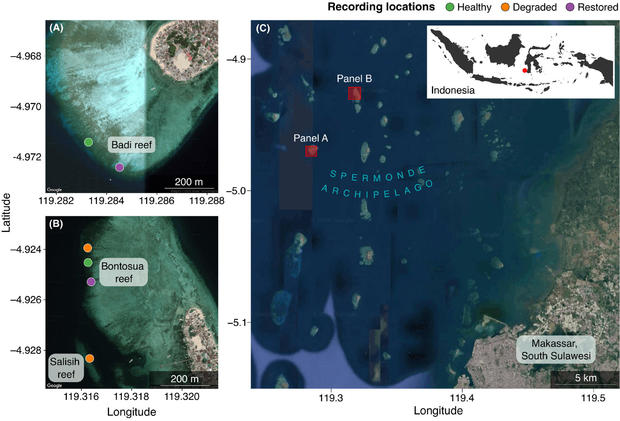"Bizarre" whoops, laughs and growls from marine creatures are the "sounds of recovery" in previously destroyed Indonesia coral reefs
Sunrise laughs, afternoon foghorns, sunset croaks and nighttime purrs — these are the sounds of Indonesian reefs returning to life, according to a new study.
Most marine environment rehabilitation programs focus on increasing coral cover, researchers said in their study, which was published in the Journal of Applied Ecology. But they wanted to see how effective restoration is for fish and invertebrate populations, which are vital components of a truly healthy ecosystem.
To find out just how healthy restored reefs can be, researchers focused on parts of reefs in Indonesia previously destroyed by blast fishing, a practice of using dynamite or other explosives to stun or kill a massive amount of marine life at a time. The areas were restored through the Mars Coral Reef Restoration Project for years preceding the study.
Researchers took multiple one-hour acoustic recordings of various habitats that are part of Indonesia's Badi, Bontosua and Salisih reefs through 2018 and 2019 that were either naturally healthy, heavily damaged or had been restored.
And they found that the restored habitats have become almost just as vibrant as those that are naturally healthy, while degraded reefs, in comparison, were rather silent.
"Restoration projects can be successful at growing coral, but that's only part of the ecosystem," lead author Tim Lamont of the University of Exeter and the Mars Coral Reef Restoration Project said in a statement. "This study provides exciting evidence that restoration really works for the other reef creatures too – by listening to the reefs, we've documented the return of a diverse range of animals."
Research say soundscapes are a crucial measure of how well a reef is thriving. Along with being an indicator of having diverse organisms successfully living in the habitats, the sounds on reefs help marine offspring return to their homes and draw in new members to their communities.
The sounds were captured throughout various parts of the day — sunrise beamed with slow pulsed growls and short tonal whoops, mornings and afternoons were filled with the crunching sounds of scrapes, and nights on the restored reef were filled with slow and gentle purrs and quickly pulsed raspberries.
Many of the sounds that were captured on the restored reef had never been recorded before.
Professor Steve Simpson of the University of Bristol said some of the sounds they heard are "really bizarre, and new to us as scientists."
"We have a lot still to learn about what they all mean and the animals that are making them. But for now, it's amazing to be able to hear the ecosystem come back to life."
Indonesia is a part of the Coral Triangle, which also includes waters of Malaysia, the Philippines, Papua New Guinea, Timor Leste and the Solomon Islands. The area is known for having nearly 600 different species of corals, six of the seven types of marine turtle species and more than 2,000 species of reef fish, according to the World Wildlife Fund.
But in 2018, a study from the Indonesian Institute of Sciences found that more than a third of Indonesia's coral reefs are in bad condition, with just 6.5% being in "excellent" condition. Marine life in the area has faced extensive threats over the years, including coastal development, overfishing, runoff associated with deforestation and construction, and the aforementioned blast fishing.
Without action on climate change, the World Wildlife Fund has also warned, reefs in the Triangle will disappear by 2100.
Lamont said that while their research does provide hope that coral reefs can be restored, it will no longer be an effective solution if the causes of reef destruction go unaddressed.
"If we don't address these wider problems, conditions for reefs will get more and more hostile, and eventually restoration will become impossible," Lamont said. "Our study shows that reef restoration can really work, but it's only part of a solution that must also include rapid action on climate change and other threats to reefs worldwide."




